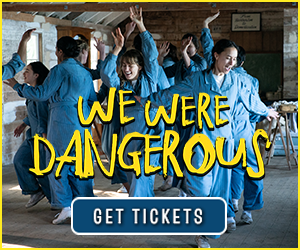THE STORY – Set in a dystopian future, this genre-bending film is inspired by Chris Marker’s iconic 1962 featurette “La Jetée.” It follows a time traveler who risks his life to change the course of history and save the future of humanity.
THE CAST – Samantha Morton, Naomi Ackie & Hector Hewer
THE TEAM – Asif Kapadia (Director/Writer) & Tony Grisoni (Writer)
THE RUNNING TIME – 83 Minutes
Suppose life ever seems a little too much like a science fiction novel. In that case, that’s because we’re apparently headed toward the self-destructive, chaotic, and apocalyptic futures only seen in those types of stories, according to Asif Kapadia’s part-documentary, part-narrative “2073.” This film is not just a warning of impending doom, but a catalyst for discussions about the current state of the world and the potential future consequences. It’s most effective when focusing on our current reality, with well-edited sequences that will certainly raise one’s blood pressure even if none of the information is that new, and less so when it jumps to a fictionalized future that doesn’t offer much emotional pull. As creative as Kapadia’s approach is with “2073,” he and co-writer Tony Grisoni miss the mark where it matters most.
The year is 2073 in New San Francisco in the New Americas. The charm of the coastal California city’s roaming hills and Victorian homes have been traded in for a post-end-of-the-world glow. Fires are burning everywhere, turning the sky a foggy orange, and buildings have been scorched and left for ruin. Elsewhere, beach waves bring in trash with the tides, while some neighborhoods are entirely flooded. Don’t worry; some things never change: the horror doesn’t affect the 1% who live at the top with their greenhouses and futuristic technology. A silent woman (Samantha Morton) narrates the disasters of her world. Her day-to-day life consists of shuffling through a mall where she’s made her residence, coming to the surface to gather scrapes, and having minimal interactions with others, including some AI people (Hector Hewer).
How did this all happen? It’s been 37 years since “the event,” which was more of a collection of horrors building up rather than just one thing. Jumping between the sci-fi narrative and a traditional documentary, Kapadia clips together a number of world events from the past 30 years that we, if not already, should be concerned about. These events include the rise of authoritarian governments around the world, whose leaders have been accused of condoning hate crimes against certain groups, such as current Indian Prime Minister Narendra Modi and attacks on Muslims in the country, as well as Israeli Prime Minister Benjamin Netanyahu and his handling of the current war with Hamas. Facial recognition software and social media can track our every move and be used to know how dangerous we are. Other current events, such as the 2016 Brexit vote, which invigorated Brits against the European Union, and the rise of AI, may not seem like they’d be big factors in the fall of life as we know it, but grouped together with everything else shows that we’re on a steady course toward a breaking point. Oh yeah, and let’s not forget the emergency climate change crisis that’s only getting worse.
For the most part, we know this information. We don’t need Kapadia to tell us that billionaires are only looking out for themselves or that hate crimes are rising around the world. But seeing them all packaged together will fill you with dread and make you say, “How are we living through all this? How are we letting this happen?” The sci-fi story doesn’t evoke as much of a response — you know it’s bad when the horrors of reality outweigh apocalyptic prose — but it’s effective in conveying what a future may look like (a news update flashes the headline “Chairwoman Trump celebrates 30th year in power” at one point). Maybe you don’t think we’ll all live underground in 50 years. Still, it’s not too far-fetched to believe many jobs will be lost due to AI replacing human workers (Naomi Ackie’s character used to be a teacher), that violence and surveillance against citizens will continue to grow, and that the rich will only get richer and the class divide will be immense.
So what are we supposed to do? It’s clear we have to act — messages flash on the screen at the beginning and end of the film, saying no one listened or did anything back then (our present). But what that entails is a mystery, and it’s beyond frustrating in a film of this nature. If you’re going to present all the horrors of the world and form your own vision for an even worse future, don’t skimp out on presenting ideas on how to mitigate the crises around us. It feels lazy to essentially say, “I did my job showing you all this; good luck!” Granted, there isn’t one answer, and it feels increasingly harder to make an impact. After all, journalists are arrested for holding governments accountable, weather events get worse each year, and AI is taking over more work than we can keep up. Regardless, he takes the easy route, leaving us more frustrated than amped up to take action.
“2073” works best when it presents the devastating facts of our world—each subject would make for a compelling documentary on its own—but it stops short of making sense of it all and giving its viewers a push toward action. It should outrage and inspire people to do something; it’s just a shame that it doesn’t provide an inspiring vision of how to do just that.






